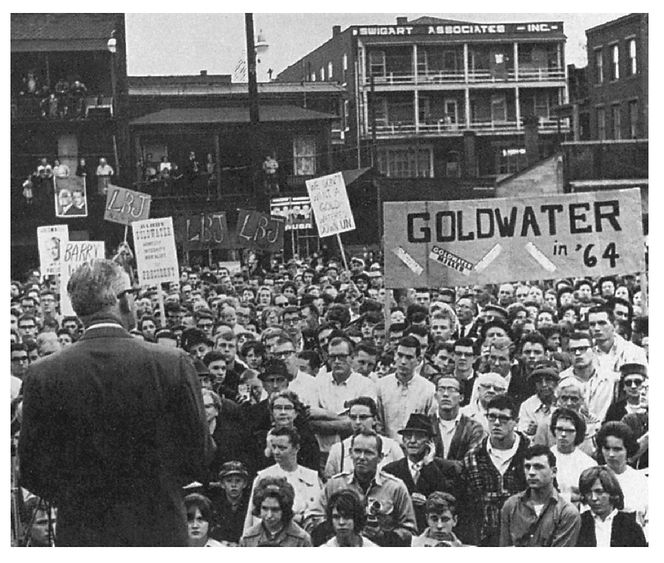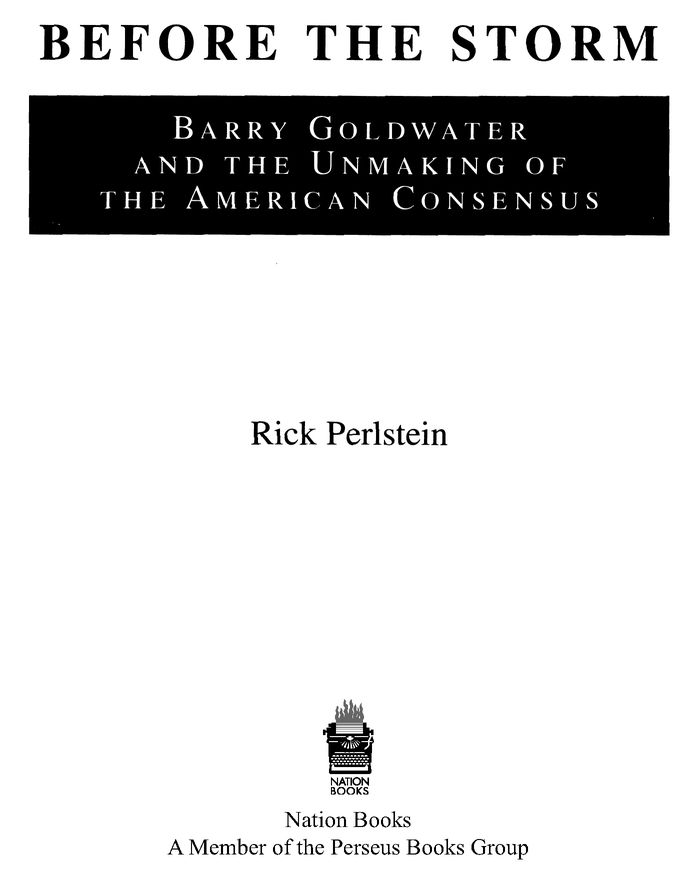Before the Storm
Authors: Rick Perlstein


Table of Contents
Â
Â
Â
Â
Â
Â
Praise for
BEFORE THE STORM
BEFORE THE STORM
“Writing with the authority of an academic historian and the dash of a journalist, Mr. Perlstein manages to break free of the partisan
idées reçues
and doctrinal laziness that typify so much writing on recent history. There is something independent, un-bought-out and, in the best sense, radical about this book.”
idées reçues
and doctrinal laziness that typify so much writing on recent history. There is something independent, un-bought-out and, in the best sense, radical about this book.”
âChristopher Caldwell,
The New York Observer
The New York Observer
Â
Â
“Occasionally a book comes along which causes historians to rethink an entire era. Rick Perlstein's remarkable
Before the Storm
is such an achievement: elegantly written, copiously researched, brimming with fresh anecdotes. Perlstein illuminates how conservatism erupted into a mass political movement while the academic scholars and media pundits were embracing Great Society Liberalism and Counterculture Despair. A truly landmark study.”
Before the Storm
is such an achievement: elegantly written, copiously researched, brimming with fresh anecdotes. Perlstein illuminates how conservatism erupted into a mass political movement while the academic scholars and media pundits were embracing Great Society Liberalism and Counterculture Despair. A truly landmark study.”
âDouglas Brinkley, author of
The Unfinished Presidency: Jimmy Carter's
Journey Beyond the White House
The Unfinished Presidency: Jimmy Carter's
Journey Beyond the White House
Â
Â
“Anyone who has read Perlstein's wonderfully colorful account of the Goldwater nomination and his subsequent defeat in November 1964 will be sorry that the book stops there ... Let us hope that Perlstein is already at work on another book about it all.”
âWilliam A. Rusher,
National Review
National Review
Â
Â
“Offer[s] much background on the remarkable fact of contemporary politics: most of our major political institutions ... are today owned by the right, although, issue by issue, the causes of the right are unpopular ... Perlstein has a nose for pungent detail. It is hard to imagine that he has missed any interesting or delicious fact about Goldwater or his circle of devotees.”
âTodd Gitlin,
Boston Review
Boston Review
Â
Â
“Perlstein is such a great storytellerâone of the most enjoyable historians I've ever read.”
âRobert Sherrill,
The Nation
The Nation
Â
Â
“One of the finest studies of the American right to appear since the days of Hofstadter. Read it and understand where the mad public faiths of our own day came from.”
âThomas Frank, editor of
The Baffler
and author of
One Market Under God
The Baffler
and author of
One Market Under God
Â
Â
“Perlstein retells this story with energy and skill ... His vibrant, detailed narrative moves swiftly and brings a large cast to life.”
âSam Tanenhaus,
The New Republic
The New Republic
Â
Â
“Comprehensive and compelling ... The heart of Perlstein's lengthy book is his colorful account of the intellectual giants, the canny political operatives, and the far-out fellow travelers in the conservative cause.”
âRichard S. Dunham,
Business Week
Business Week
Â
Â
“Before the Storm
is told dazzlingly. Perlstein re-creates the social and cultural milieu that gave rise to the conservative movement with earned authority and easy patience ... Insightful, gracefully written, well-paced and sympathetic to its central characters' motivations.”
is told dazzlingly. Perlstein re-creates the social and cultural milieu that gave rise to the conservative movement with earned authority and easy patience ... Insightful, gracefully written, well-paced and sympathetic to its central characters' motivations.”
âMichael Tomasky,
Newsday
Newsday
Â
Â
“Perlstein's narrative ... is never less than compelling, brilliantly researched and reported.”
âSara Scribner and David Daley,
The Hartford Courant
The Hartford Courant
Â
Â
“Although conservative Republicans suffered a humilating defeat in 1964, the principles they had embraced and the organization they had built endured, soon to bring them local, state and then national victories. Perlstein tells this story with energy and insight, and in lively prose.”
âGary Gerstle,
Dissent
Dissent
Â
Â
“Finally, a gifted writer has told the full story of the difficult birth and exuberant adolescence of the conservative movement that went on to transform American politics. Rick Perlstein's indispensable history is stuffed with wit, learning, and drama. After reading it, you will never think of the 1960s in the same way again.”
âMichael Kazin, co-author of
America Divided: The Civil War of the 1960s
America Divided: The Civil War of the 1960s

Rick Perlstein
BEFORE THE STORM: BARRY GOLDWATER AND THE UNMAKING OF THE AMERICAN CONSENSUS
RICK PERLSTEIN is the author of
Nixonland: The Rise of a President and the Fracturing of America.
His essays and reviews have been published in
The New York Times, The Washington Post, The Nation, The Village Voice
, and
Slate,
among other publications. He has received a National Endowment of the Humanities grant for independent scholars, and he is a senior fellow at the Campaign for America's Future. He lives with his wife in Chicago.
Nixonland: The Rise of a President and the Fracturing of America.
His essays and reviews have been published in
The New York Times, The Washington Post, The Nation, The Village Voice
, and
Slate,
among other publications. He has received a National Endowment of the Humanities grant for independent scholars, and he is a senior fellow at the Campaign for America's Future. He lives with his wife in Chicago.


It is the folly of too many to mistake the echo of a London coffee-house for the voice of the kingdom.âJonathan Swift
Â
Â
Politics ain't bean bag.âMr. Dooley
PREFACE
A
t their 1964 convention in San Francisco, the Republican Party emerged from a corrosive faction fight between its left and right wings to do something that was supposed to be impossible: they nominated a conservative. Barry Goldwater went down to devastating defeat in November at the hands of Lyndon Johnson, and there, for most observers, the matter stood: the American right had been rendered a political footnoteâperhaps for good.
t their 1964 convention in San Francisco, the Republican Party emerged from a corrosive faction fight between its left and right wings to do something that was supposed to be impossible: they nominated a conservative. Barry Goldwater went down to devastating defeat in November at the hands of Lyndon Johnson, and there, for most observers, the matter stood: the American right had been rendered a political footnoteâperhaps for good.
The wise men weighed in. Reston of the
Times
: “He has wrecked his party for a long time to come and is not even likely to control the wreckage.” Rovere of
The New Yorker
: “The election has finished the Goldwater school of political reaction.” “By every test we have,” declared James MacGregor Burns, one of the nation's most esteemed scholars of the presidency, “this is as surely a liberal epoch as the late 19th Century was a conservative one.”
Times
: “He has wrecked his party for a long time to come and is not even likely to control the wreckage.” Rovere of
The New Yorker
: “The election has finished the Goldwater school of political reaction.” “By every test we have,” declared James MacGregor Burns, one of the nation's most esteemed scholars of the presidency, “this is as surely a liberal epoch as the late 19th Century was a conservative one.”
Some, recalling the words of Thomas Dewey, worried for the future of the two-party system itself: if the parties realigned along ideological axes, he had said, “the Democrats would win every election and the Republicans would lose every election.” Others imagined, in the words of a
Partisan Review
writer, “a recrudescence on American soil of precisely those super-nationalistic and right-wing trends that were finally defeated in Europe at the cost of a great war, untold misery, and many millions dead.”
Partisan Review
writer, “a recrudescence on American soil of precisely those super-nationalistic and right-wing trends that were finally defeated in Europe at the cost of a great war, untold misery, and many millions dead.”
It was one of the most dramatic failures of collective discernment in the history of American journalism. After the off-year elections a mere two years later, conservatives so dominated Congress that Lyndon Johnson couldn't even get up a majority to appropriate money for rodent control in the slums. The House Republican Caucus elected as chair of its Policy Committee John Rhodes, one of Barry Goldwater's Arizona protégés. In 1964 there were sixteen Republican governors, all but two of them moderates; in 1966 ten new conservative Republican governors were voted in. In 1980 Americans elected
one of them, Ronald Reagan, as their President. And in 1995 Bill Clinton paid Reagan tribute by adopting many of his political positions. Which had also been Barry Goldwater's positions. Here is one time, at least, in which history was written by the losers.
one of them, Ronald Reagan, as their President. And in 1995 Bill Clinton paid Reagan tribute by adopting many of his political positions. Which had also been Barry Goldwater's positions. Here is one time, at least, in which history was written by the losers.
This is a book about how that story began.
Â
It is hard, now, to grasp just how profoundly the tectonic plates of American politics have shifted between 1964 and today. Think of a senator winning the Democratic nomination in the year 2000 whose positions included halving the military budget, socializing the medical system, reregulating the communications and electrical industries, establishing a guaranteed minimum income for all Americans, and equalizing funding for all schools regardless of property valuationsâand who promised to fire Alan Greenspan, counseled withdrawal from the World Trade Organization, and, for good measure, spoke warmly of adolescent sexual experimentation. He would lose in a landslide. He would be relegated to the ash heap of history. But if the precedent of 1964 were repeated, two years later the country would begin electing dozens of men and women just like him. And not many decades later, Republicans would have to proclaim softer versions of these positions just to get taken seriously for their party's nomination. The analogy wouldn't be exaggerating what has happened since 1964 too much. It might even be underplaying it. When commentators want to remark on today's sweeping embrace of market thinking, the retreat of the regulatory state, and America's military role as the “indispensable nation,” a shorthand rolls off their tongue: “There Is No Alternative”âTINA. But such things have been said before.
Other books
Cupid's Daughter by Sparks, Libby
Blurring the Lines by Mia Josephs
Ride the Tiger by Lindsay McKenna
Scorch: M/M Gay Shifter Mpreg Romance (Dragon's Destiny: Fated Mates Book 2) by Specter, Wolf, Knots, Angel
Rexanne Becnel by The Knight of Rosecliffe
What No One Else Can Hear by Brynn Stein
To Rescue or Ravish? by Barbara Monajem
Draw the Brisbane Line by P.A. Fenton
The Story of Us by Deb Caletti